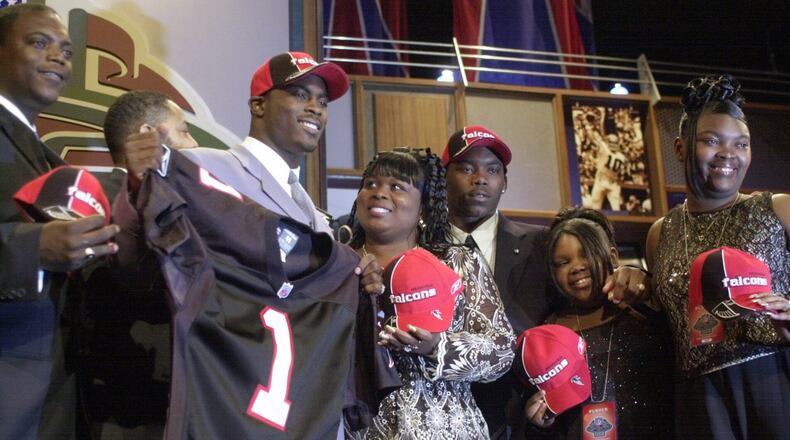The Falcons drafted Michael Vick No. 1 overall on April 20, 2001. They had an incumbent quarterback of some distinction, this having become Chris Chandler’s sixth and most successful NFL stop. He’d started 123 NFL games. He’d made the Pro Bowl twice, both times as a Falcon. He’d presided over two playoff wins, both as a Falcon. He’d taken this club to its first Super Bowl.
On the day Vick was drafted, Chandler was 35. He turned 36 in October, when he was still the starting quarterback.
On the day the Falcons drafted Michael Penix, their No. 1 quarterback – we can’t call Kirk Cousins an incumbent, given that he just got here himself – was 35. Cousins will turn 36 in August. The Falcons are his third NFL employer. He has made the Pro Bowl four times, having started 145 NFL games. He has presided over one playoff victory.
The Falcons of Dan Reeves had a succession plan for Vick, and they stuck to it. He played as a sub in the 2001 opener, throwing four passes, completing none. He started against Dallas on Nov. 11, Chandler having suffered a rib injury. On that day, Vick led the Falcons to victory. He didn’t start again until the season finale. That ended his apprenticeship.
The Falcons made Chandler available to the Houston Texans in the expansion draft; he wasn’t chosen. He signed with Chicago, where he remained for two seasons. He then signed with the Rams, for whom he threw six interceptions in his first start. He was out of the league at 39. In his first season as an NFL starter, Vick led the Falcons to a famous playoff victory at Lambeau Field.
At his best, Chandler was seldom seen as a Franchise Quarterback. He’d been drafted in Round 3 by Indianapolis, where he started as a rookie. Over 17 NFL seasons, only twice – in Year 1 with Indy and the Super Bowl season here – would his team go better than .500 in his starts.
The Falcons paid a modest price – two down-draft picks – for Chandler’s services in 1997. As an Oiler, he’d been rendered surplus by Steve McNair. New to the job, Reeves needed a quarterback. Chandler proved better than anyone anticipated, making his first Pro Bowl.
In September 1998, Chandler accepted a five-year extension at $27 million. On Jan. 31, 1999, he and his team graced the Super Bowl. Alas, the bulk of that contract saw diminishing returns. The Falcons over Chandler’s final three seasons: 4-12, 5-11, 7-9. Enter Vick.
The similarities between Chandler-to-Vick and Cousins-to-Penix aren’t exact. Today’s Falcons are paying Cousins a massive sum – $180M, $100M of it guaranteed, over four seasons – and Penix isn’t quite the prospect Vick seemed. (Few prospects have ever been.) Still, the Falcons see both as Franchise QBs, though there can’t be two of those at once.
And so, on Day 1 of Penix’s rookie camp, we ask: How might this succession plan work? Our guess is …
Year 1: Assuming Cousins is and stays healthy, Penix mostly sits. There’s no good way to find significant playing time for a backup QB without harming the overall product. (Remember how unmemorable Justin Fields’ moments at Georgia were?) The Falcons expect to win this season, meaning everyone in Flowery Branch is on some sort of clock. At issue: How does Cousins’ clock square with Penix’s?
Year 2: Assuming the Falcons under Cousins fare well in Year 1, continuity might seem prudent. Here, though, we reference the Chiefs: After Alex Smith led them to the playoffs in 2017, he was traded to Washington to make way for Patrick Mahomes. It’s hard to believe the Falcons saw Cousins as a one-and-done when they were, ahem, hastening to sign him, but how long can they let Penix sit?
Year 3: This would seem the most probable moment for the actual succession. Anything sooner might be unfair to Cousins, anything later unfair to Penix. In September 2026, he’ll be 26 – Vick became the Falcons’ starter at 22 – and Cousins will be 38. Also: After two years, the guaranteed part of Cousins’ contract will have been met.
Year 4: There’s no way both Cousins and Penix are Falcons in 2027.
The catch with any succession plan is that it’s subject to developments. What if the Falcons don’t love Penix as much in August 2025 as they did in April 2024? What if Cousins clicks with the assembled skill players and has a Matt-Ryan-in-2016 season? How long can a club go with a $180M signee and Round 1 rookie in its QB room, not to mention its cap rolls?
I don’t know. I doubt the Falcons do, either. But we’re about to find out.
The above is part of a regular exercise available to all who register on AJC.com for our free Sports Daily newsletter. The full Bradley’s Buzz, which includes extras like a weekly poll and pithy quotes, arrives via email around 1:30 p.m. on Monday, Wednesday and Friday.
Go to the AJC.com home page. Click on “newsletters” at the bottom. Click on “Sports Daily.” You’ll need to enter your email address. Thanks, folks.
About the Author
Keep Reading
The Latest
Featured



